If you’ve ever planted raspberries, you might already know, they don’t always stay where you put them. So, are raspberries invasive? The short answer is yes, a little. But the longer answer is that raspberries are only “invasive” if they’re left to spread unchecked. With the right setup and a few easy tricks, you can enjoy a thriving raspberry patch without it taking over your garden.
This post may contain affiliate links. If you use these links to buy something we may earn a commission. Thanks.
Quick Answer: Are Raspberries Invasive?
Yes, raspberries are invasive in the sense that they spread quickly through underground runners (called suckers). These shoots pop up a few feet away from the mother plant, allowing the patch to expand naturally each season.
That vigorous growth is what makes raspberries so resilient, and so deliciously abundant. But, it also means you’ll need to manage them just a little.
In short: Raspberries spread fast, but they’re easy to control once you know how. More on this later.
A Brief History of Raspberries
Raspberries have been cherished for centuries. Native to both Europe and North America, red raspberries (Rubus idaeus) were used medicinally in ancient Greece and Rome. Indigenous peoples in North America used wild raspberries for both food and medicine long before European settlers arrived. Today, hybridization has given us many cultivars with unique colors, flavors, and growth habits.
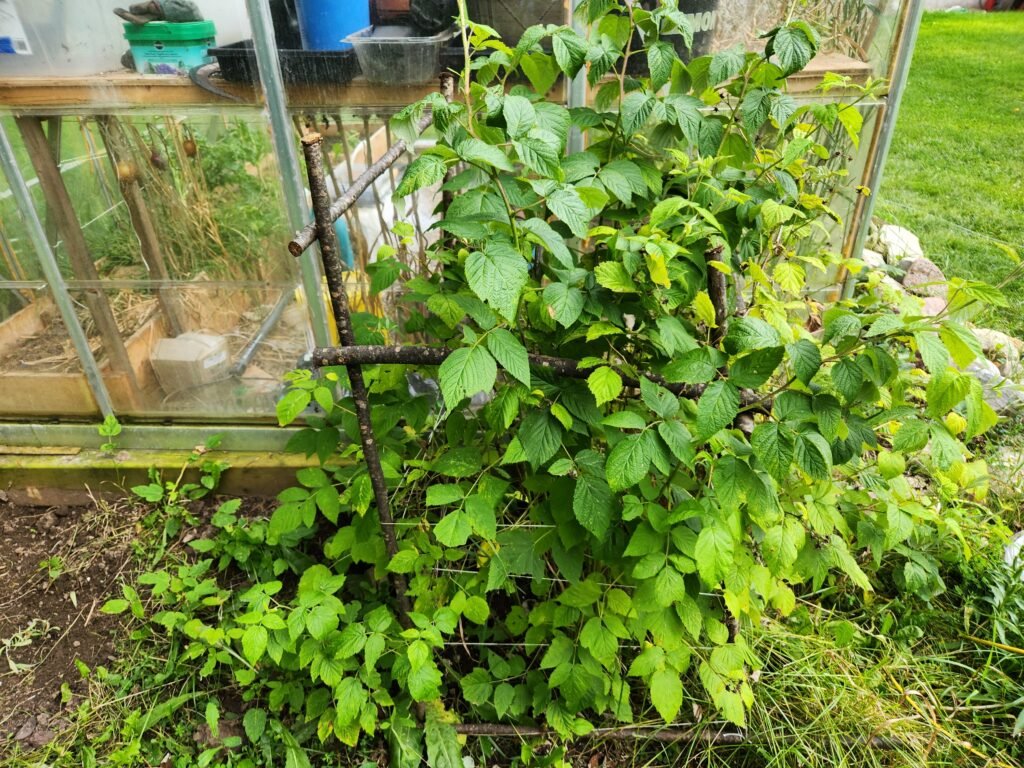
Medicinal Benefits of Raspberries: Health Benefits You Should Know
Raspberries aren’t just delicious – they’re also packed with powerful nutrients and have been used medicinally for centuries. Both the fruit and the leaves of the raspberry plant (Rubus idaeus) have traditional and modern health applications.
1. Antioxidant Powerhouse
Raspberries are rich in antioxidants, the antioxidant properties help:
- Reduce inflammation
- Combat oxidative stress
- Protect cells from damage linked to aging and disease
2. Rich in Fiber for Gut Health
Just one cup of raspberries provides 8 grams of fiber, which supports digestion, promotes regularity, and may help:
- Lower cholesterol
- Stabilize blood sugar
- Support a healthy microbiome
3. Supports Heart Health
Raspberries are high in vitamin C, potassium, and polyphenols – all of which support cardiovascular health. Regular consumption may:
- Lower blood pressure
- Improve circulation
- Reduce the risk of heart disease
4. Raspberry Leaf Tea: An Herbal Remedy
Beyond the fruit, raspberry leaves have long been used in herbal medicine – especially for women’s health. Raspberry leaf tea has been called “the woman’s herb” due to its traditional use in supporting fertility and easing labor. Raspberry leaf tea is known for:
- Easing menstrual cramps
- Supporting reproductive health
- Strengthening the uterus during the third trimester in pregnancy (consult your healthcare provider first), however it’s commonly used to support the uterus leading up to labour from 36+ weeks.
- Raspberry Leaf Tea Benefits: A Complete Herbal Guide
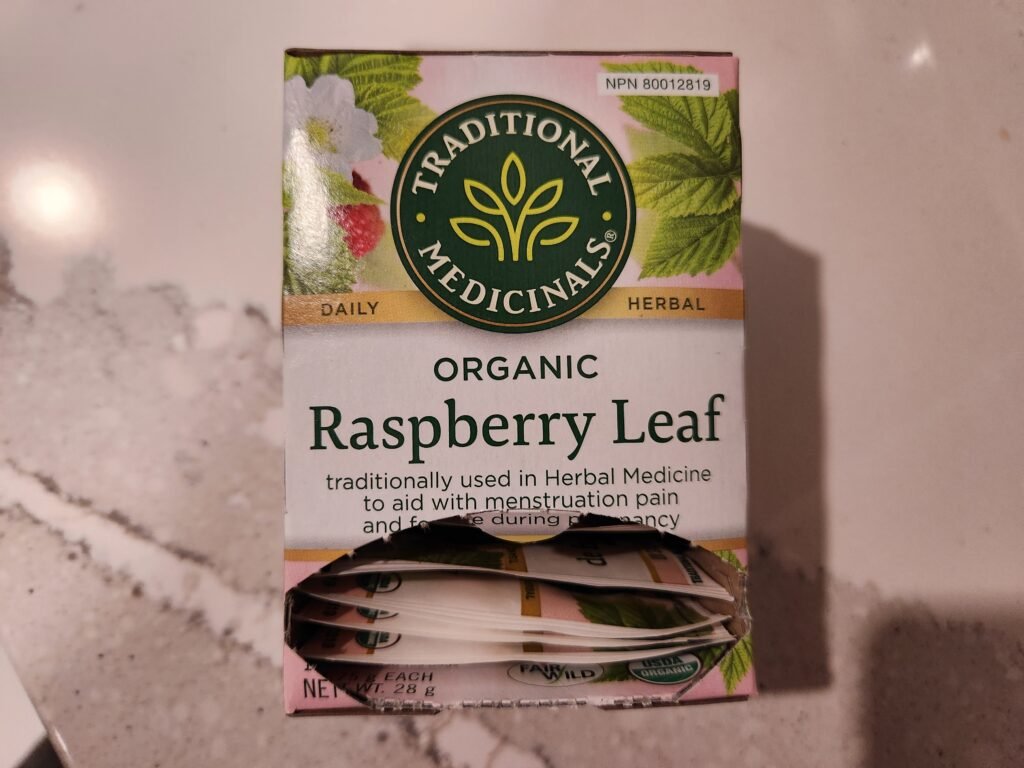
5. Potential Cancer-Fighting Properties
Some studies suggest that compounds in raspberries – particularly ellagic acid – may have anti-cancer properties. While more research is needed, early findings are promising in slowing the growth of certain cancer cells.
How to Use Raspberries Medicinally
Incorporating raspberries into your daily routine is an easy (and tasty) way to boost your health naturally. Whether you’re enjoying them by the handful or sipping on a soothing raspberry leaf tea, this fruit offers more than just a sweet bite.
- Eat them fresh or frozen daily for overall wellness (as snacks, in yogurt or oatmeal, blend in a smoothie, etc).
- Make a red raspberry leaf tea by steeping dried leaves in hot water (this is the common method recommended for women’s health)
- Use raspberry extract supplements (talk to a healthcare provider first)
- Apply mashed berries topically for antioxidant-rich DIY skincare masks
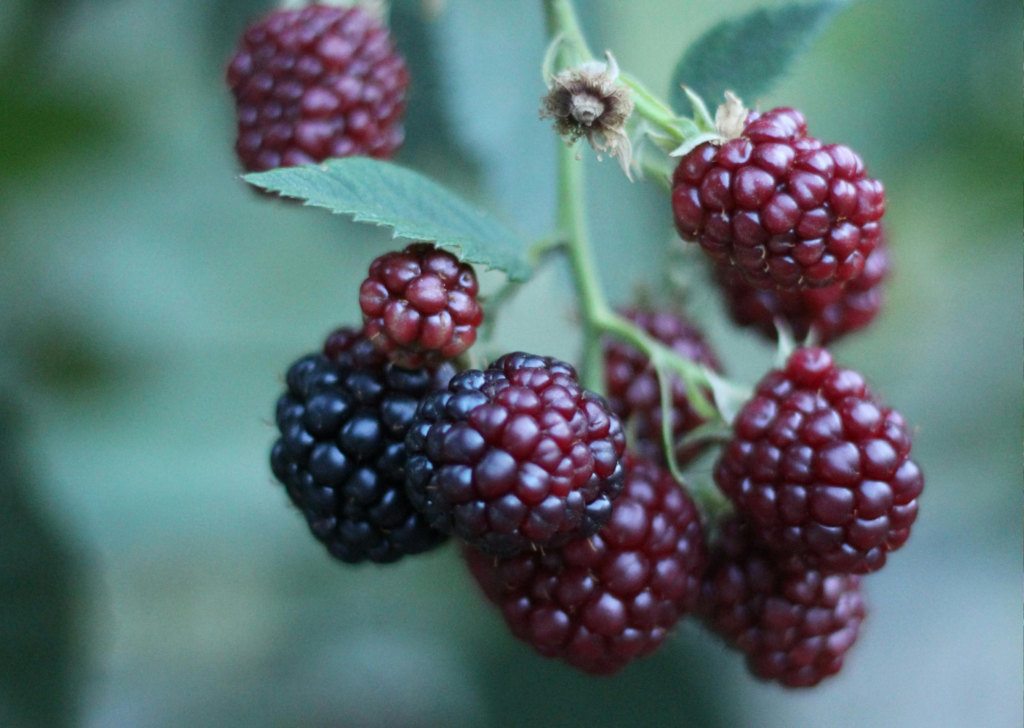
Raspberries or Strawberries?
I get asked this question all of the time. So I wrote an article dedicated to breaking down the essential differences between each fruit. Each fruit is unique and every gardener’s property is unique so its hard to give an easy answer without context. Read the raspberries vs strawberries, which fruit is better article here.
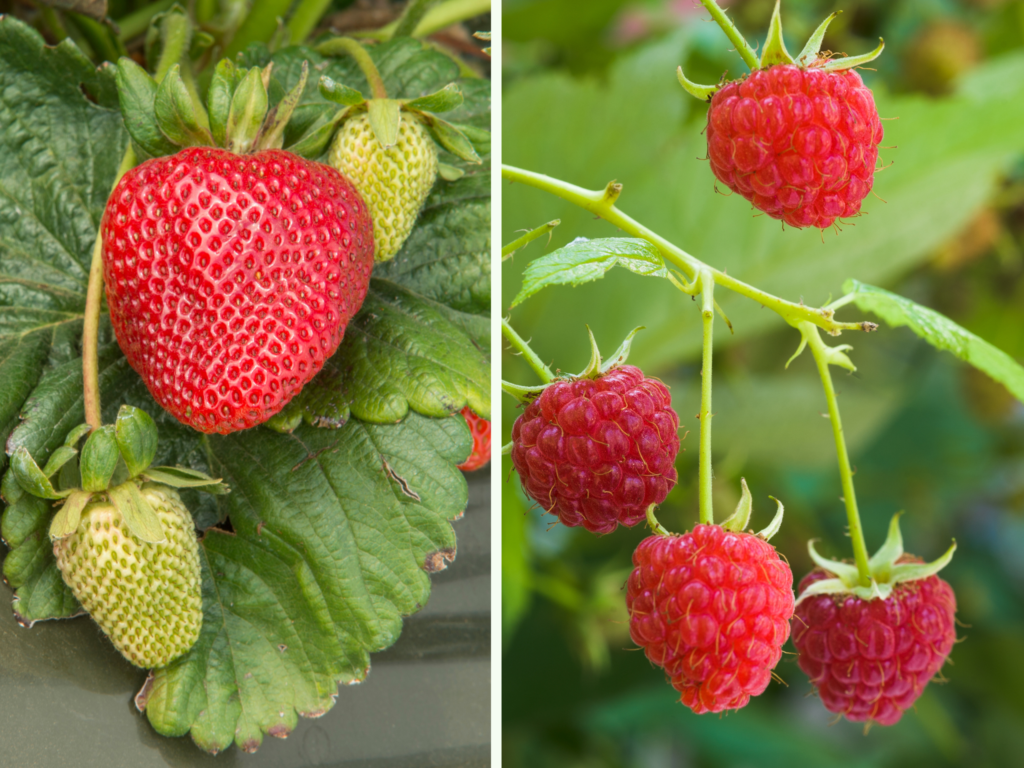
Are Raspberries Invasive?
What Does “Invasive” Mean in the Garden?
If you’ve read my previous posts when I talk about the term “invasive”, you know how I feel. “Invasive” doesn’t always mean harmful – sometimes it just means vigorous. Raspberries spread through underground runners, called suckers, which can quickly turn one tidy patch into a sprawling bramble if left unchecked over years.
Some gardeners love this; others not so much. If you’re in a small space or aiming for a more controlled garden layout, this spreading behavior can be frustrating. There are many common garden plants that do this, mint can be invasive, and also possibly tomatoes can be invasive, check them out if you want to learn a little about those ‘invasive’ plants.
How to Control Raspberry Spread
There’s a funny saying, “If you want to start trying for kids – start planting fruit!”. This is beyond accurate, the amount of money we would be spending if we didn’t have some fruit and vegetables on the property would be astronomical – and it still is even with the plants! I personally don’t know why one would want to control the spread of raspberry plants as it’s free food. But if you’re looking for a way to control it, here’s some easy tips:
- Plant in raised beds or large containers to contain suckers. Easiest and best method to control anything that’s considered ‘invasive’.
- Prune suckers regularly outside your desired area. Learn about how to prune raspberries in this guide.
- Mulch heavily to discourage unwanted growth. Learn all about mulching techniques and best practices here.
If you want to start a raspberry patch, try choosing fall-bearing varieties, they tend to be slightly less aggressive than summer-bearing ones when it comes to spreading.
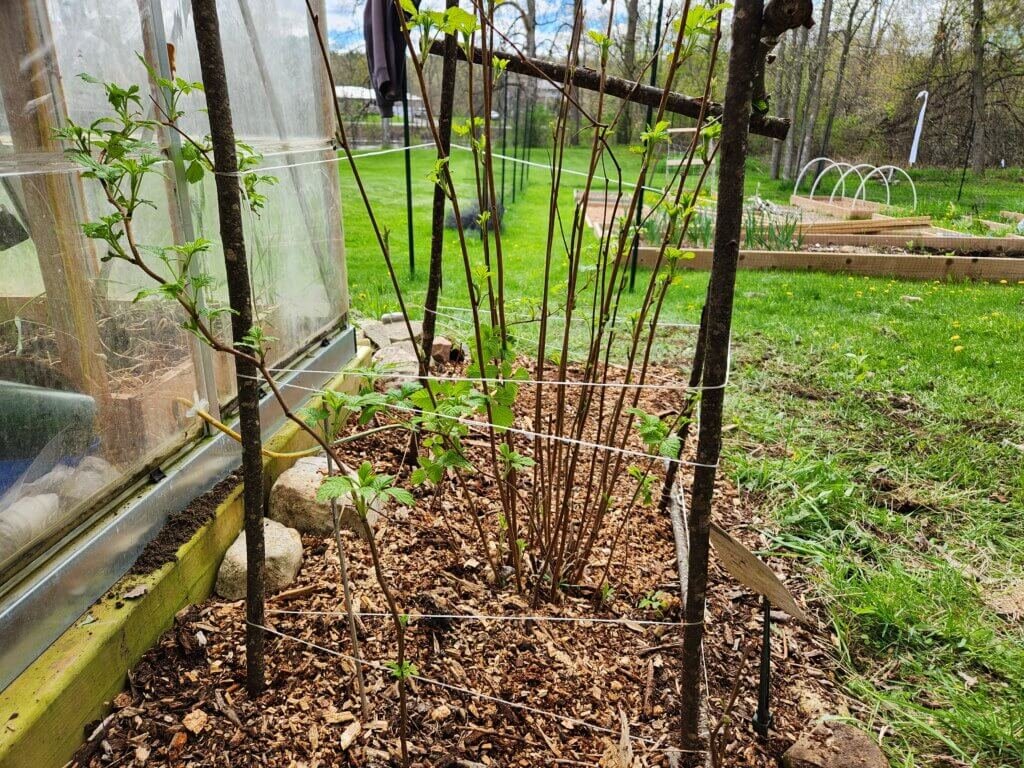
Raspberry Growing Tips for Healthy, Bountiful Harvests
Like most fruit plants, raspberries love lots of sun, slightly acidic soil and need consistent moisture.
- Sunlight: Full sun (6–8 hours a day)
- Soil: Well-draining, slightly acidic (pH 5.5–6.5). Easily test your soil with a soil tester.
- Water: Consistent moisture, especially during fruiting
- Spacing: 2–3 feet between plants, 6–8 feet between rows
- Support: Trellises or stakes help keep canes upright and increase airflow, this is vital to long-term support and growth of your raspberry plants – plan for good support ahead of time.
Common Raspberry Growing Mistakes to Avoid
- Overwatering (leads to root rot)
- Ignoring pruning (causes reduced yields and more disease). Learn more about pruning raspberries here.
- Planting in poor soil without amending
- Letting them spread unchecked
What To Do With Raspberries Invasive Abundance?
So, you’ve planted a large raspberry patch or have wild raspberries growing in abundance around your property. You’re tired of eating fresh raspberries 24/7 – what can you do with all this yield?
- Jam: Jam is a cooked down fruit with a 50:50 ratio of fruit to sugar.
- Preserves: This is what people call ‘jam’ that isn’t an exact 50:50 ratio, it’s maybe only 10% sugar or whatever the cook prefers. It’s technically not jam or jelly.
- Freeze Drying: On a baking sheet, spread out in the raspberries so there’s space between each and lay in freezer for 12 hours. Remove and add to a freezer bag. Use within the next few months.
- Dry Leaves: Dry out red or black raspberry leaves (pick before the plant starts fruiting) and use for women’s health needs. Use a dehydrator for best and easy results.
FAQs About Raspberries
Yes! Raspberries are perennial, meaning they come back yearly. However, their canes are biennial — they grow vegetatively the first year and fruit the second.
– Summer-bearing types: After fruiting, cut old canes to the ground.
– Fall-bearing types: Cut all canes back in late winter for a single big fall harvest.
Yes! Especially helpful if you’re worried about raspberries being invasive. Use a large pot (at least 5 gallons), well-draining soil, and place in full sun.
Moderate, consistent watering is key: about 1–1.5 inches per week. Avoid letting the soil dry out completely during fruiting.
They’re most vigorous in temperate climates with ample rainfall. In hot, dry areas, they may spread less aggressively but still benefit from root containment.
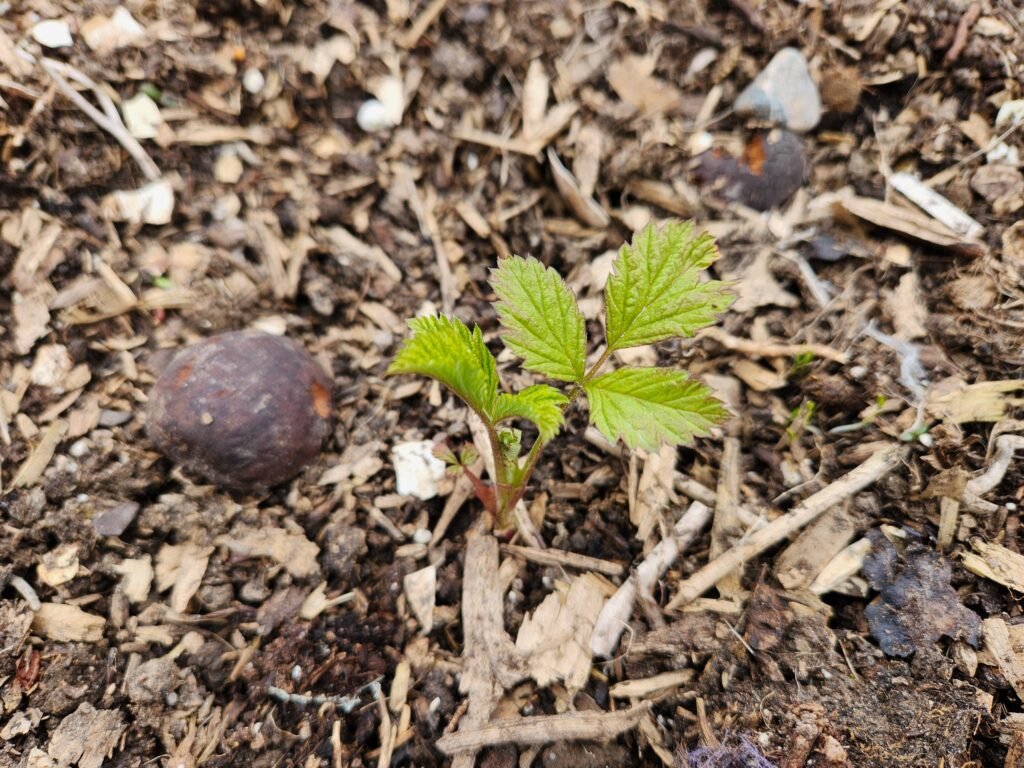
How to Make Raspberries Work for Your Garden (Not Against It)
With their spreading nature, raspberries are perfect for: Food forests, Permaculture gardens, edible hedges, and pollinator-friendly landscapes.
But not ideal for: Small, ornamental beds and lawns or borders near shared fences (unless well-contained).
Raspberry Articles
Want to learn more about raspberries? Here’s all our related content:
- How to Grow Black Raspberries (Complete Care & Pruning Guide)
- How to Grow Red Raspberries (Summer-Bearing and Fall-Bearing)
- Wild Black Raspberry Plant: How to Grow, Cultivate, and Prune Them Successfully
- What’s the Difference Between Wild Black and Black Raspberries?
- Pruning Raspberries: Step-by-Step for Each Variety
- Raspberries or Strawberries – Which Is the Better Fruit to Grow?
- Raspberry Leaf Tea Benefits: A Complete Herbal Guide
Final Thoughts: Are Raspberries Worth the Trouble?
Absolutely -as long as you understand what you’re getting into. Their invasive tendencies can be managed, and their payoff in flavor, nutrition, and beauty is well worth the effort.
TL;DR: Yes, raspberries are invasive – but also delicious, resilient, and surprisingly easy to manage with a little planning.
If you’re growing berries at home, you can explore all of our hands-on advice in our Berry Growing Guides, based on what actually works here on our homestead.
We are growing our website with more articles all the time, and we invite you to grow with us. If you have any questions about raspberries or would like to share some of your knowledge with us please leave a comment below. Happy Gardening!

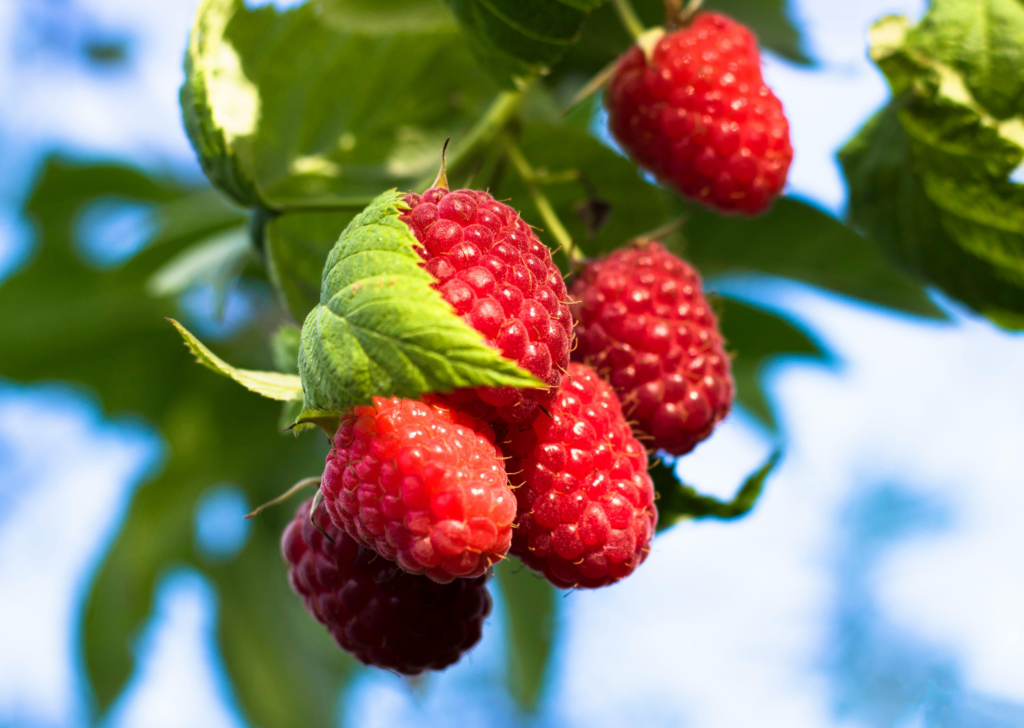
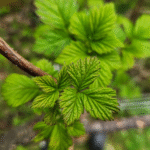
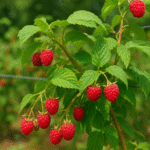

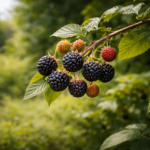
I love raspberries. So do my kids. I have black and red raspberries. Their unique flavor isn’t for everyone, but I was raised eating them, and I passed it o on to my kids.
Thank you so much for sharing that, Jim! Raspberries are a favorite around here too—I’m passing the love on to my little ones as well. It’s awesome that you grow both black and red varieties; the flavor difference is so fun to explore. Do you have a favorite way to enjoy them? Thanks again for reading and taking the time to comment! 😊